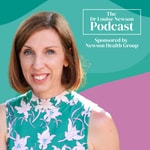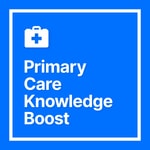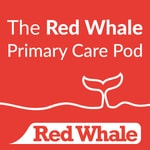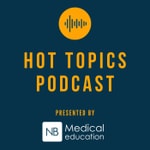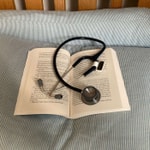The GP+ Careers Podcast – Détails, épisodes et analyse
Détails du podcast
Informations techniques et générales issues du flux RSS du podcast.
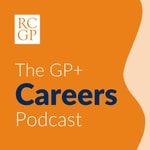
The GP+ Careers Podcast
Royal College of General Practitioners
Fréquence : 1 épisode/22j. Total Éps: 15

Classements récents
Dernières positions dans les classements Apple Podcasts et Spotify.
Apple Podcasts
🇬🇧 Grande Bretagne - medicine
02/08/2025#51🇬🇧 Grande Bretagne - medicine
01/08/2025#79🇬🇧 Grande Bretagne - medicine
31/07/2025#44🇬🇧 Grande Bretagne - medicine
18/07/2025#99🇬🇧 Grande Bretagne - medicine
17/07/2025#61🇬🇧 Grande Bretagne - medicine
16/07/2025#86🇬🇧 Grande Bretagne - medicine
13/07/2025#57🇬🇧 Grande Bretagne - medicine
12/07/2025#35🇬🇧 Grande Bretagne - medicine
11/07/2025#58🇬🇧 Grande Bretagne - medicine
07/07/2025#85
Spotify
Aucun classement récent disponible
Liens partagés entre épisodes et podcasts
Liens présents dans les descriptions d'épisodes et autres podcasts les utilisant également.
See all- https://themovementprescription.co.uk/
57 partages
- https://thebms.org.uk/
36 partages
- https://movingmedicine.ac.uk/
16 partages
Qualité et score du flux RSS
Évaluation technique de la qualité et de la structure du flux RSS.
See allScore global : 52%
Historique des publications
Répartition mensuelle des publications d'épisodes au fil des années.
5: GP+ Undergraduate Medical Education with Dr Egbe Efefaroro
Épisode 5
vendredi 20 septembre 2024 • Durée 15:12
Top tips:
- Gain taster experience: Get involved with your local medical school for example as a casual tutor; personal development tutor; GP tutor for students assigned to your practice or volunteer as OSCE examiner. If interested, send an email to the medical school about any opportunities to get involved
- It’s a win-win: You can learn a lot from teaching and interacting with students. Egbe says that this keeps her fresh and up to date with the latest guidelines which is also useful for her own learning and professional development. This in turn also benefits her patients in general practice which is a win-win!
- Do I need additional qualifications? Egbe recommends obtaining a postgraduate degree in Medical Education i.e PgCert, PgDip or Masters - offered by various universities either in-situ or online, usually as a part time programme to allow learners to do it alongside their clinical work. Egbe did the one at Keele University.
- Do a ‘Teach the Teachers’ course. This is a two-day course designed to help clinicians learn about educational concepts and techniques to deliver effective clinical teaching sessions. This is offered free by some universities for clinicians who have contact with their medical student
- Become a role model: Inspire the next generation of doctors through your love of teaching and general practice. Share your interesting cases with your students, what surprised you? How did you deal with difficult situations? This may in turn inspire and encourage them to pursue a career in general practice. During a time of recruitment and retention crises in general practice this may help to future proof the profession.
Further reading
Teach the teachers course
https://teachthedrteacher.com/
Postgraduate Clinical Education - Keele University
www.keele.ac.uk/study/postgraduatestudy/postgraduatecourses/clinicaleducation/
In Practice fellowship
https://www.nihr.ac.uk/explore-nihr/academy-programmes/integrated-academictraining.htm#four
Tell us what you thought!
Please take 2 minutes to complete the survey about this episode.
4: GP+ Sexual Health with Dr Rachel Taylor
Épisode 4
vendredi 20 septembre 2024 • Durée 18:14
Top tips:
- Consider the motivation for the role: Be very clear what your drivers are for taking on the additional role e.g. is it an area you have a passion for, is it to have more flexibility in your career or even increase your income? Once you have established your ‘why’ seek out the opportunities.
- Embrace the flexibility: Your life can change over the years with family and career commitments but you can find a role to suit you. You may be able to pick up shifts in your local sexual health clinics to suit your schedule.
- Increase your competence with a qualification: There are qualifications such as the DFSRH which fits very well with general practice with a very well resourced, accessible website and achievable qualification if you are already doing your GP training.
- Start your search close to home: Not sure where to start? Rachel recommends contacting your local gynae clinics and offer to sit in and speak to the team about opportunities available. Most local sexual health services are run by public health which is another option to explore. You could also join webinars/events on sexual health and contact those who are teaching on it directly about opportunities or further study.
- There may be funding available: If you want to gain expertise in sexual health ask your practice if they can fund you to train in fitting coils/implants, but you should also be prepared to fund yourself or do it in your own time. Another option for funding could be through a fellowship scheme. Sometimes bursaries are available which could be used to backfill some of your time or pay for you to go on courses and enable you to work elsewhere.
Dr Rachel Taylor is a GP Partner, Trainer, Appraiser and Mentor. She has a special interest in Sexual Health and is a DFSRH Faculty Trainer. She works mainly as a GP but has always worked in Sexual Health clinics to support her interest, clinical skills and awareness in this area.
Further reading
The Faculty of Sexual & Reproductive Healthcare
https://www.fsrh.org/
RCGP Women's Health Library
https://elearning.rcgp.org.uk/course/index.php?categoryid=57
RCGP Women's Health Toolkit
https://elearning.rcgp.org.uk/mod/book/view.php?id=12534
RCGP Gynaecology and Women's Health Hub
https://elearning.rcgp.org.uk/course/view.php?id=772
FSRH Diploma
https://www.fsrh.org/education-and-training/diploma/
British Menopause Society
https://thebms.org.uk/
West Midlands Association for Contraception and Sexual Health
https://wmcash.org.uk/
Tell us what you thought!
Please take 2 minutes to complete the survey about this episode.
3: GP+ Frailty with Dr Alistair Robertson
Épisode 3
vendredi 20 septembre 2024 • Durée 15:35
Top tips:
- Make the most out of your networks - Seek out any hospital frailty teams or your GP practice the frailty lead. Don’t be afraid to speak to them to find out how to get involved, do some home visits or basic frailty or comprehensive geriatric assessments to familiarise yourself with the work
- Upskill yourself – It's always helpful to increase your knowledge base on frailty by completing a diploma in geriatric medicine for example, but it’s not essential when starting out
- Determine what sort of doctor do you want to be - find an area where you can be that doctor that you want to be. It's within every GP to go off and do these things as it's all the things you've learned coming into play that you excel at with our communication, working with other teams and being the hub for the care of the patient
- Apply yourself – with frailty you don’t need to carry any separate medical skills that other doctors don’t have; it's just you maybe have a little bit more opportunity to apply what you do know
- Endless learning opportunities – frailty is an area of work that is growing exponentially year on year due to an ageing population. You have a chance to learn from your team and your patients which is an exciting addition to the ‘day to day’ GP role.
Further reading
RCGP GPwER in Frailty Framework
https://www.rcgp.org.uk/your-career/gp-extended-roles/purpose-of-frailty
Joining the dots: A blueprint for preventing and managing frailty in older people
https://www.bgs.org.uk/Blueprint
Podcast with learning resources on frailty and elderly care: https://thehearingaidpodcasts.org.uk/
Understanding how integrated care systems are supporting older people; case studies on integrated care
https://www.england.nhs.uk/integratedcare/resources/case-studies/integrated-care-in-action-older-peoples-care/
Diploma in geriatric medicine
https://www.rcplondon.ac.uk/diploma-geriatric-medicine
Tell us what you thought!
Please take 2 minutes to complete the survey about this episode.
2: GP+ Expedition Medicine with Dr Nadia Tharib
Épisode 2
vendredi 20 septembre 2024 • Durée 18:01
Top tips
- The variety is unmatched - From following a group of teenagers doing a Duke of Ed to going to going to Mount Everest basecamp, there is huge variation in what constitutes as expedition medicine
- Educate yourself - There are courses available to provide education in expedition medicine. There are also diplomas and masters level qualifications. These are a great way to build your knowledge and confidence and to network with like-minded people but they are not essential to be an expedition medic
- Make friends for life - Expedition medicine is an exciting opportunity to meet a range of really interesting people, make friends for life and share your incredible stories with your patients in your day to day GP job!
- It’s never too early to start - Don’t be afraid to explore courses you are interested in early on in your GP career journey. Nadia completed an expedition medicine course in her F2 which helped her to think on her feet and improvise – great skills that compliment everyday general practice
- Trust your gut - In expedition medicine, have the confidence to recognise a sick patient when you see one and be prepared to potentially manage them on your own.
- Is it for you? Nadia advises to go on a trip as a member first to find out if you enjoy expedition medicine, as it may not be suitable for everyone. For example being ‘on-call’ during the expeditions in often hostile environments whilst always remaining calm and positive can be challenging.
Further reading
The Adventure Medic website: https://www.theadventuremedic.com/
Raleigh International website: https://raleighinternational.org/
World Extreme website: https://worldextrememedicine.com/
Tell us what you thought!
Please take 2 minutes to complete the survey about this episode.
1: The GP+ Careers podcast - Introduction with Dr Helena McKeown and Dr Sophie Lumley
Épisode 1
jeudi 19 septembre 2024 • Durée 09:03
In this introductory episode, Dr Helena McKeown, Medical Director for Professional Development and Quality at the RCGP, interviews podcast host Dr Sophie Lumley to find out the purpose of the podcast, how it came to be and her key takeaways from the podcasts so far.
Dr Sophie Lumley, is a First5 GP in Shropshire, West Midlands and a Training Programme Director. She decided to start this podcast to hear all about the additional GP career options available to her, her colleagues and her trainees and how to start developing them.
Tell us what you thought!
Please take 2 minutes to complete the survey about this episode.
6: GP+ Learning Disabilities with Dr Ayesha Mahmud
Épisode 6
vendredi 15 novembre 2024 • Durée 27:37
Top tips:
- You can always change direction of travel – Ayesha previously had a background in minor surgery and changed to learning disabilities as it was a passion of hers with a personal meaning to drive change
- Find your Tribe – Ayesha recommends exploring the RCGP Special Interest Group for Learning Disabilities where you can connect with those who share your special interest, expand your networks and opportunities and learn from each other
- Raise awareness of your work – If you are working to improve the quality of patient care for those with learning disabilities, it is important to raise awareness of this as it can lead to more joined up thinking and improved patient outcomes
- Expand your knowledge - Ayesha highly recommends the RCGP One Day Essentials courses for different topics which are now free to members to book
- Small changes can be rewarding – Implementing small changes in your practice can be hugely beneficial to patients. Ayesha provides an example of this whereby her GP Practice has an alert system set up for a patient on the learning disability register, so the receptionist is notified and can try to make reasonable adjustments for them such as a longer appointment time.
Further reading
Post graduate qualification
PGCert Learning Disability and/or Autism | Edge Hill
RCGP Special Interest Group for Learning Disabilities with contact and joining details
Learning disabilities group
RCGP One Day Essentials on Learning Disabilities - free to attend
RCGP One Day Essentials conferences
New to Practice fellowship schemes possibly available across different regions (check with your local commissioners about fellowship opportunities in their area)
New to Practice GP Fellowships
Regular webinars & meetings are held by British Institute for Learning Disabilities
Membership | bild
Palliative care planning for people with Learning Disabilities
End Of Life Care Planning | The Victoria And Stuart Project
Fairhealth
Free learning resources to help reduce Health Inequalities
Learning Disability Friendly Badge
Learning Disability Friendly Badge - Happy Healthy Lives
Ayesha’s awards - The Martin Wilkinson Award at RCGP Midland Faculty Award and the Highly Commended Best Collaborative Award at the RCGP Inspire Awards 2024
COVENTRY & WARWICKSHIRE LEARNING DISABILITY FRIENDLY BADGE RECOGNISED WITH TWO RCGP AWARDS - Happy Healthy Lives
Tell us what you thought!
Please take 2 minutes to complete the survey about this episode.
8: GP+ Appraiser with Dr Nicky Wilson
Épisode 8
vendredi 24 janvier 2025 • Durée 16:09
Top tips:
- Build a career to suit you – the role offers flexibility in terms of how many appraisals you want to take on each year (usually up to 22-24) and these can be done at a time that suits you and your appraisee. You also need to consider the time dedicated both before the appraisal for preparation and the write up afterwards in your overall time commitment.
- Seek inspiration from others – Nicky enjoys finding out what others are doing as part of their personal development plans (PDP) and is often inspired by their ideas for innovative practice and new ways of working. Some of these ideas may inspire you to make improvements in your own GP practice.
- Reach out to your local networks – if you want to become an appraiser, Nicky advises that you reach out to your local appraiser team about recruitment opportunities and application process. If you aren’t successful the first time – don’t give up! Ask for feedback and apply again.
- Consult with your colleagues – as an appraiser, Nicky states she was assigned a senior appraiser who she could seek advice from. She also attends small group meetings facilitated by experiences appraisers where they come together to talk about new guidance on appraisal/revalidation, difficult cases etc.
-
Consider brushing up on your soft skills – Nicky suggests coaching/mentoring training can help bring out these soft skills beneficial when applying to be an appraiser such as empathy, good listening skills and providing constructive feedback to others.
Further reading
RCGP guide to your appraisal
https://www.rcgp.org.uk/your-career/revalidation/appraisal-guide-introduction
Appraisal bodies in the Devolved Nations
Scotland
https://www.appraisal.nes.scot.nhs.uk/
Wales
https://heiw.nhs.wales/support/revalidation-support-unit/gp-appraisal/
Northern Ireland
https://www.nimdta.gov.uk/gp-appraisal-revalidation-and-mentoring/gp-appraisal/
NHSE appraisal information
https://www.england.nhs.uk/professional-standards/medical-revalidation/appraisers/
RCGP Mentoring platform
https://www.rcgp.org.uk/your-career/gp-mentoring
Tell us what you thought!
Please take 2 minutes to complete the survey about this episode.
7: GP+ Genomics with Dr Will Evans
Épisode 7
jeudi 12 décembre 2024 • Durée 21:32
Top tips
- Explore the world of Genomics - There are several great resources to familiarise yourself with Genomics. Will recommends looking at Health Education England (HEE) website for genomics educational resources particularly the GeNotes resource. Other excellent resources include the RCGP Genomics Toolkit
- Join the Primary Care Special Interest Group - if you are interested in finding out more about how you can be involved with Genomics, Will recommends joining the Primary Care Interest Group that Will is a member of. This has a number of GPs but also community pharmacists from across the country with differing interests and roles and is a great place to find out about opportunities and connect with like-minded peers
- Carve a diverse career path - with the growing integration of genomics in healthcare, GPs with expertise in this area are likely to be in higher demand. There is a range of opportunities to work in specialized clinics, academic settings or policy-making roles related to genetics
- Drive progress through Innovative Practice - Be part of the cutting edge of healthcare, applying the latest advancements in genetics to clinical practice. Will has been involved in several transformational projects such as improving care coordination of patients with rare genetic diagnoses as they transition from paediatric to adult services.
- Set clear boundaries - like any special interest, when you are working in that area for one day for example, there can be a risk that work can fall in other days that you aren't doing that role. Will suggests that you define your week quite carefully and protect your time - set clear boundaries and stick to them for the best work-life balance.
Will works as a salaried GP in Leeds, and as a GP with a specialist interest in Genetics with the Yorkshire regional genetic service. He is the primary care lead for the North East and Yorkshire Genetic Medicine Service Alliance (GMSA).
Will is also an Honorary Assistant Professor at the University of Nottingham. His research interests involve rare diseases, genomics in primary care, large data base analysis and precision medicine.
He is a trustee and former chairman of the rare disease charity Niemann-Pick UK.
Further reading
RCGP Genomics framework
https://www.rcgp.org.uk/your-career/gp-extended-roles/introduction-clinical-genetics-genomics
RCGP Genomics toolkit
https://elearning.rcgp.org.uk/mod/book/view.php?id=12892
GeNotes – quick concise information for healthcare professionals to make the right genomic decisions. Specific section for Primary care clinicians.
https://www.genomicseducation.hee.nhs.uk/genotes/
National genomic test directory- details what tests are available for what indication and who can request (NHS England)
https://www.england.nhs.uk/wp-content/uploads/2024/07/national-genomic-test-directory-rare-and-inherited-disease-eligibility-criteria-v7.pdf
Embedding genomics across the NHS: a primary care perspective. – A review of genomics and its role and impact in primary care
https://doi.org/10.7861%2Ffhj.2023-0116
To find out more about the Primary Care Special Interest Group (SIG) in Genomics contact england.administration.genomicseducation@nhs.net
Tell us what you thought!
Please take 2 minutes to complete the survey about this episode.
9: GP+ Working in Secure Environments with Dr Juli McCulloch
Épisode 9
vendredi 21 février 2025 • Durée 26:46
Top tips
- Research the different types of secure environments - There are a range of secure environments you can work in as a GP including open prisons, higher security units, immigration detention centres, and more. Juli works in a high security men's prison but she urges you to consider the type of secure environments near to you that interest you.
- The job can be rewarding but emotionally demanding -Patients in these environments tend to have more complex needs and have experienced more trauma, often resulting in more mental health and substance use concerns. You need to consider how to care for yourself and your emotional resilience as well. Juli mixes prison shifts with a varied work week within a Portfolio career to protect herself from burnout.
- Contacts are key - Juli highlighted that she secured an interview for her other role in substance misuse through her GP partner colleague, who had a contact in the local addiction services. Connect with GPs already working in secure environments to gain first-hand accounts of their experiences, join online forums, and seek out mentorship opportunities in this area. She found this route much easier and more informative than searching for job adverts and listed vacancies.
- Preserve human dignity and provide empathy - It’s important to always approach individuals in secure environments with empathy and respect, recognizing their vulnerability. Juli states that a simple, human connection can make a significant difference in their experience and well-being.
- Same but different - Juli highlights that she was not required to complete any additional qualifications to work in the prison environment. Although the structure and environment is different a lot of the day-to-day clinical work is exactly the same as that of your community GP clinics including chronic disease management, triaging patients, prescriptions for the pharmacists, and dealing with queries from the nurses. In Juli’s experience she also sees fewer patients per shift, allowing you to spend more time if the patient needs it.
Dr Juli McCulloch is a First5 GP working in Fife and Tayside. She divides her working week between a long-term locum GP post, a salaried post in secondary care addiction services, and a few shifts monthly at her local prison.
Further reading
RCGP Secure Environments hub
https://elearning.rcgp.org.uk/course/view.php?id=561
RCGP Secure Environments elearning course
https://elearning.rcgp.org.uk/enrol/index.php?id=560
RCGP Secure Environments group
https://www.rcgp.org.uk/about/communities-groups/secure-environments
RCGP Mentoring
https://www.rcgp.org.uk/your-career/gp-mentoring
BMA Forensic and secure environments committee
https://www.bma.org.uk/what-we-do/committees/forensic-and-secure-environments-committee/forensic-and-secure-environments-committee-overview
BMA Forensic and secure environments ethics toolkit
https://www.bma.org.uk/advice-and-support/ethics/working-in-detention-settings/forensic-and-secure-environments-ethics-toolkit
Tell us what you thought!
Please take 2 minutes to complete the survey about this episode.
10: GP+ Migrant Health with Dr Sarah Clark
Épisode 10
vendredi 14 mars 2025 • Durée 12:36
Top tips
- Provide Holistic patient care - When working with those held in immigration detention, it is important to consider the whole person in front of you, addressing both the physical and psychosocial aspects of your patient’s health. Migrants may face multiple stressors, including housing insecurity, lack of social support, or financial difficulties, which can affect their mental health too.
- Manage the Emotional Impact - Working with migrant populations, especially those facing trauma can be emotionally taxing. Take time for self-care and seek professional support when needed. Sarah recommends taking some down time after the assessments. Medical Justice also offer groups with a psychotherapist that you are welcome to attend. They also offer six funded sessions of psychotherapy per year to support your mental wellbeing as a GP.
- Explore uncharted territory - If you are interested in getting involved, Sarah recommends attending one of the Medical Justice basics training days which are advertised on their website, usually held twice a year. Sarah encourages you to sign up to their mailing list to find out first about upcoming training dates. The training provides an overview of the work involved and an opportunity to decide if it is for you. There's no commitment as you can try a few assessments to see if it's something you want to pursue a career in.
- Do your research - Research the main charities websites who do this type of work such as Medical Justice, the Helen Bamber Foundation and read through statements from both patients and doctors who work for these charities. Some of the organisations host webinars where you can stay up to date on their website and social media channels for upcoming events to attend to get more information.
Further reading
Medical Justice website
https://medicaljustice.org.uk/
Helen Bamber Foundation website
https://www.helenbamber.org/
RCGP GPwER in Population Health and Health Inequalities Framework
https://www.rcgp.org.uk/your-career/gp-extended-roles/population-health-inequalities-introduction
RCGP Asylum seekers and vulnerable migrants
https://www.rcgp.org.uk/representing-you/policy-areas/asylum-seekers
RCGP Health Inequities Hub and Health Equity Special Interest Group
https://elearning.rcgp.org.uk/course/view.php?id=459
RCGP Mentoring
https://www.rcgp.org.uk/your-career/gp-mentoring
Migrant Health guide
https://www.gov.uk/government/collections/migrant-health-guide
Tell us what you thought!
Please take 2 minutes to complete the survey about this episode.
